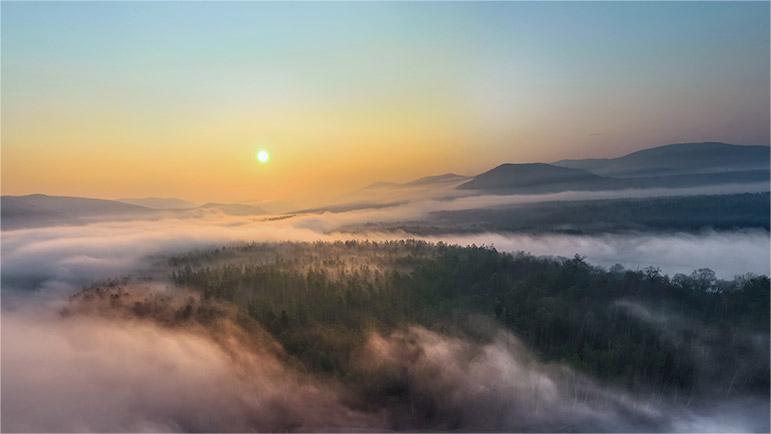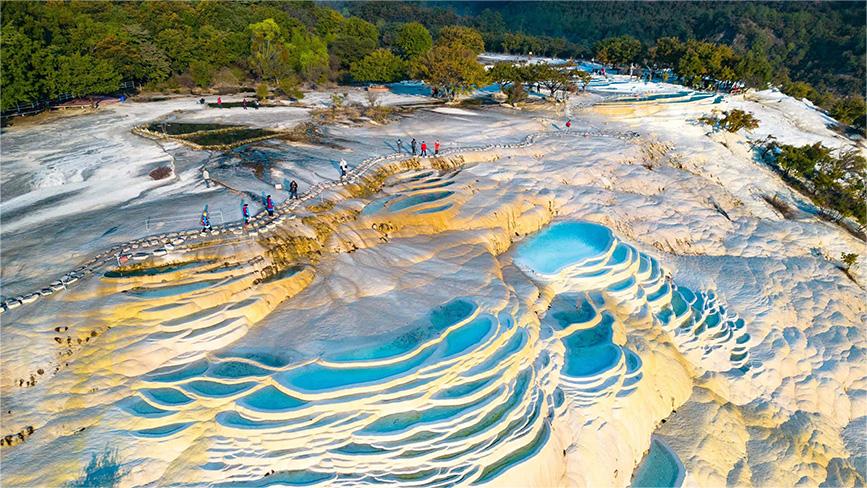Parks themed on traditional Chinese culture gain momentum
BEIJING, Aug. 21 (Xinhua) -- In an amusement park themed on Journey to the West, an ancient literary classic of China, performers dressed as Sun Wukong, also known as Monkey King, and a number of immortals in Chinese mythology paraded on the floats to a series of fast-paced rhythms, while greeting the excited crowd.
The park, located in Huai'an, east China's Jiangsu Province, the hometown of the novel's author Wu Cheng'en, recreates famous scenes from the title, such as the Monkey King subduing the white bone demon and the cave dwelling of spider spirits. Visitors can experience the epic adventure of the Monkey King and his companions from China to India in search of Buddhist scriptures through modern technology.
Opened in 2021, the Xiyou World of Adventure rose to popularity as a result of the creative marketing of the Monkey King IP, which is well-known throughout China. For some time, it was at the top of the theme park popularity ranking chart on Douyin, a popular social media platform.
Lisa, a tourist from Shanghai, said entertainment facilities in the park are well-designed. "The ride project themed on Monkey King subduing the white bone demon is no less good than the Harry Potter ride in the Universal Beijing Resort," she said.
With improved living standards, more Chinese travelers in recent years have turned to theme parks for recreation and a break from work or study, creating huge market potential. Besides famous international brands like Disneyland and Universal Studios, parks themed on traditional Chinese cultural elements from mythology or ancient dynasties have gained momentum.
"Unique Henan: Land of Dramas," a gigantic immersive theater complex, in Zhengzhou, central China's Henan Province, takes visitors back thousands of years into the province's rich history.
Covering more than 40 hectares, the site comprises 21 theaters with close to 1,000 actors, performing various shows themed on the history of Henan and the culture of the Yellow River, the "mother river" of the Chinese nation. In some of the theaters, visitors are even mixed with performers wearing ancient costumes, a perfect chance to savor the grandeur of Chinese civilizations from up close.
A tourist from Anhui Province named "Sesame" said these homegrown theme parks offer a rich collection of performances at prices much more attractive than their more well-known foreign competitors. For a family of two adults and one child, the Xiyou park charges 358 yuan (about 50 U.S. dollars), less than a third of the price of Shanghai Disneyland Resort.
Lin Huanjie, director of the Institute for Theme Park Studies in China, said theme parks developed solely by China have made rapid progress with brand-new IPs rich in Chinese cultural connotations.
"Theme parks play an increasingly important role in implementing the country's general policy to integrate culture into tourism to meet consumer demands for higher-quality travel experiences," Lin said. "In this regard, how do we turn the rich Chinese history and culture into IPs with commercial value is a major challenge for businesses."
Boasting a vast source of visitors with spending power, Lin said China is bound to be the major arena for global theme parks in the coming years, opening broad prospects for industry development.
According to a report issued by the institute in 2023, international-brand theme parks Disneyland and Universal Studios were still far ahead of their Chinese competitors in terms of comprehensive competitiveness, based on infrastructure, convenience of transport, market influence and operational performance.
The report covered 80 theme parks in China each with an area of 40 hectares more, or with a total investment of 1.5 billion yuan or higher. It showed that these large-scale theme parks are mostly located in major cities or places with convenient transport. In 2021, a Silk Road themed park opened in Xinjiang Uygur Autonomous Region in the country's far northwest, the first theme park in the region.
Lin said homegrown theme parks still lag behind their foreign counterparts not just in technology but also in business philosophy and IP development. He suggested they draw from foreign experiences and seek innovative and differentiated business models.
Meanwhile, Lisa suggested that homegrown theme parks improve their abilities to handle visitor flow at peak times. "After all, people won't come back again if their first-time experience was bad," she added.
Photos
Related Stories
Copyright © 2024 People's Daily Online. All Rights Reserved.









